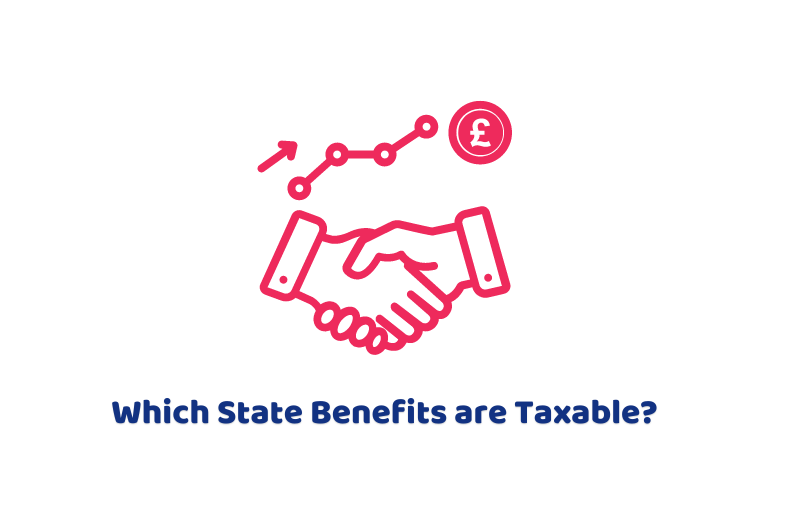Taxable State Benefits become a hassle for those who are getting state benefits like state pension or Jobseeker Allowance (JSA) or other benefits. How can one know about these benefits if they are taxable or not?
If this is the question worrying you, we have got you covered. We will help you in finding out the answer to this question by allowing you to differentiate between the taxable and non-taxable state benefits.
In this blog, we will walk you through the state benefits, both taxable and non-taxable state benefits. Moreover, we will discuss the role of the Department of Work and Pension (DWP) and HMRC in this process. So, read on to learn about this important discussion!
State benefits might be tricky in terms of taxes in the UK. AccountingFirms can assist you in determining the taxable state benefits and how much you owe. Give us a call or send us a message.
What are the State Benefits?
State benefits in the UK are provided by the Department of Work & Pension (DWP) for the welfare of low-income, disabled, retired or unemployed people. The state benefits go beyond these benefits and they are distributed with the intention to keep up the standard of living of the people.
These social benefits or allowances can be taxable or non-taxable. HMRC will collect income tax on some, if not all, of these state-funded allowances.
Taxable State Benefits
Following is the list of the taxable state benefits in the UK. If you receive any of these benefits, you have to work out how much tax you owe to the HMRC in a given tax year.
- Bereavement Allowance (previously Widow’s pension).
- Carer’s Allowance.
- Contribution-based Employment and Support Allowance (ESA).
- Incapacity Benefit (from the 29th week you get it).
- Jobseeker’s Allowance (JSA).
- Pensions paid by the Industrial Death Benefit scheme.
- State Pension.
- Widowed Parent’s Allowance.
Non-Taxable State Benefits
Following state benefits are exempt from income tax and you don’t need to pay tax to the HMRC for receiving these allowances and benefits.
- Attendance Allowance.
- Bereavement support payment.
- Child Benefit (income-based – use the Child Benefit tax calculator to see if you’ll have to pay tax).
- Child Tax Credit.
- Disability Living Allowance (DLA).
- Free TV licence for over-75s.
- Guardian’s Allowance.
- Housing Benefit.
- Income Support – though you may have to pay tax on Income Support if you’re involved in a strike.
- income-related Employment and Support Allowance (ESA).
- Industrial Injuries Benefit.
- lump-sum bereavement payments.
- Maternity Allowance.
- Pension Credit.
- Personal Independence Payment (PIP).
- Severe Disablement Allowance.
- Universal Credit.
- War Widow’s Pension.
- Winter Fuel Payments and Christmas Bonus.
- Working Tax Credit.
How Do You Pay Tax on State Benefits?
Typically, you get your income as PAYE if you are employed or have an employer. On the other hand, if you are self-employed, then you have to calculate your tax returns as Self-Assessment Tax Returns.
The tricky part is most of the taxable benefits your receive from the Department of Work & Pension (DWP) are not paid via PAYE, Instead, you receive your benefits in full without any taxable deductions.
State Pension is the only taxable state benefit. So, HMRC will ask you to submit a Self-Assessment Tax Return or a simple assessment report. If you have any other source of income along with the state pension, then HMRC will change the tax code provided by your employer or another benefit provider.
The taxes work differently for Job Seekers Allowance (JSA) and Employment Support Allowances (ESA). For this, you will get a form of P45 from the DWP, detailing all the income and tax paid on them by your previous employer. They will pay your complete benefit and pay without any taxes deductions.
However, if you do not need these benefits anymore, DWP will notify the HMRC about it and repay a tax if you owe any tax. Otherwise, HMRC will start the process of collecting the extra tax.
The Bottom Line
The only taxable state benefit is the state pension. However, DWP works differently from PAYE, your tax code might become a puzzle for you. You can change your tax code by asking the HMRC or they will do it for you.
On the other hand, you need to subtract your tax-free income including state benefits from the total taxable income. One key point is here you need to add the Job seekers Allowance and Employment Support Allowance in your tax returns as they are taxable state benefits.
AccountingFirms is the best place where you can find clever, qualified and experienced tax advisors for your tax issues. Feel free to contact our team of qualified accountants and bookkeepers now!
Disclaimer: All the information provided in this article on Taxable State Benefits, including all the texts and graphics is general in nature. It does not intend to disregard any of the professional advice.

